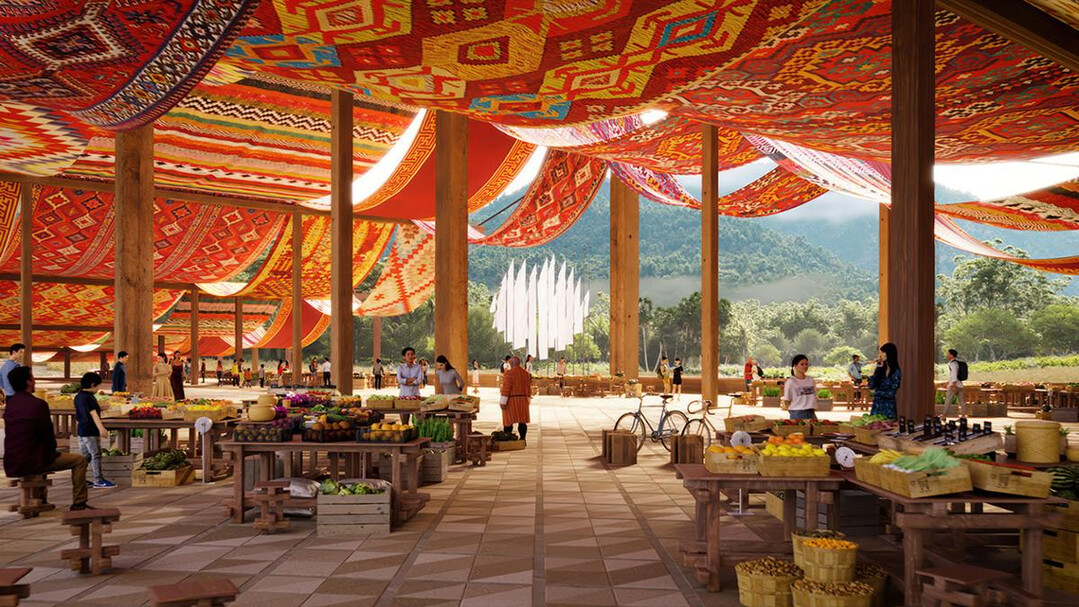
THIMPHU, Bhutan – Bhutan, renowned for its Gross National Happiness Index and status as the world's first carbon-negative country, has launched an ambitious project to build a 386-square-mile (1,000 square kilometers) "Mindfulness City" in Gelephu. This megacity, envisioned as a sustainable development bridge between South and Southeast Asia, aims to transform Bhutan into a regional economic hub, attracting foreign investment while preserving its unique cultural and environmental heritage.
King Jigme Khesar Namgyel Wangchuck officially launched the Gelephu project in December, outlining a vision for a city that blends economic prosperity with Buddhist spiritual values. The development will feature a new international airport, a hydroelectric dam incorporating a temple, a university, and a railway, all designed to capitalize on the burgeoning economic activity in the region. The World Bank reports that trade in the area has surged from $38 billion to $349 billion in the past 20 years.
"There are economic hubs elsewhere that invite foreign investment by providing a conducive business environment and compelling incentives. Bhutan's economic hub will offer all that and more," King Wangchuck stated, emphasizing that Gelephu will be a "one-of-a-kind development" inspired by Bhutanese identity and spiritual heritage.
The project, designed by BIG (Bjarke Ingels Group), Arup, and Cistri, is a crucial component of the King's green agenda, addressing talent drain and fostering sustainable growth. The first phase of this 20-plus-year project is slated for completion within the next five years.
"Mindfulness City will be a sustainable city. To be mindful is to be aware—to perform best," said Giulia Frittoli, partner and head of landscape at BIG. The city's location, along Bhutan's border with India, was chosen for its relatively flat terrain, facilitating development while minimizing environmental impact.
Sustainable Construction and Environmental Preservation
A key feature of Mindfulness City is its commitment to sustainable construction. All buildings will utilize stone, mass timber, and engineered bamboo, reflecting Bhutan's leadership in promoting "carbon-positive buildings." The Kingdom has been at the forefront of adopting cross-laminated timber (CLT), nail-laminated timber (NLT), and glulam in construction.
In January, Bhutan's Department of Housing Settlement introduced a policy prioritizing mass timber construction systems, aiming to replace concrete and steel-based alternatives. This initiative aligns with the 2023 publication, "Innovating Bhutan's residential construction with mass timber for economic and environmental sustainability," which advocates for mass timber-hybrid construction systems.
Bhutan's commitment to environmental preservation is deeply rooted in its constitution, which mandates forest protection. With over 70% of the country covered in dense forests, Bhutan is a global biodiversity hotspot. The Gelephu project's master plan, revealed in late 2023, emphasizes preserving these forests and creating corridors for rivers and the more than 700 elephants that migrate between India and Bhutan.
"We started with a landscape perspective before an urban perspective. We started from the environment," Frittoli explained, highlighting the project's focus on creating natural getaways for water and wildlife.
Economic and Cultural Development
The Gelephu project will focus on three key areas: energy, connectivity, and skills. India is collaborating with Bhutan to enhance connectivity along the border. The new international airport in Gelephu is designed to serve as a vital gateway, boosting tourism and trade.
Prior to the COVID-19 pandemic, cultural and religious tourism accounted for over 80% of Bhutan's foreign visitors. The Kingdom aims to expand its tourism offerings in the coming decades, attracting a diverse range of visitors.
King Wangchuck's decree underscores the significance of the Gelephu project, calling it "an inflection point, a mandate and opportunity for us all—the King, the government, and the people—to join hands and work tirelessly to pave the road to the future." He envisions Gelephu as a gateway connecting Bhutan to global markets, capital, new ideas, knowledge, and technology, charting a course for the Kingdom's destiny.
This ambitious project reflects Bhutan's commitment to sustainable development, blending economic growth with its unique cultural and environmental values, and positioning itself as a leader in the region.
[Copyright (c) Global Economic Times. All Rights Reserved.]






























